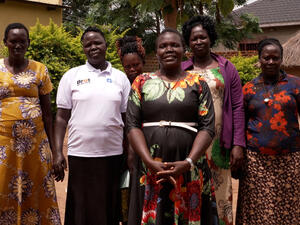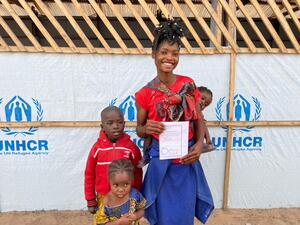Student returns to Somalia with dream of becoming a doctor
Student returns to Somalia with dream of becoming a doctor

Rahma and her eight-year-old sister Kadra before embarking on their return journey in August, 2015.
DADAAB REFUGEE CAMP, Kenya, Sept 3 (UNHCR) - Six years ago when Rahma, first arrived in Kenya as a refugee, she was illiterate. Now, 19, she has returned with plans to be a doctor.
Last month, Rahma was on board two repatriation flights carrying 116 returnees from Kenya to Somalia - the final leg of what has been a transformative journey.
She returned to her family not only full of hope, but also determined to pursue her studies.
"I am very happy because when I arrived in Dadaab I did not know how to write and read," she said. "Now I can communicate well." She can not only read, write and speak fluent English, but also has plans to become a medical doctor.
"I've studied a lot of biology because I want to become a medical doctor," she says. "Now, I am reading a book by a South African doctor. I want to read, read, read, and continue my school studies. I will work hard then, God allows, I will succeed in my life."
She intends to complete her secondary education in Mogadishu and then look for a scholarship to study in a medical university.
Rahma's journey as a refugee began in December 2009, when she was 13. Forced to flee the conflict in Somalia, she arrived at Dadaab and settled in Hagadera camp, the largest and one of the oldest camps within the Dadaab complex, the world's largest.
For many refugees in Dadaab, peace and education - often the first casualties of ongoing conflict - are the most valuable aspects of life as a camp refugee. Together, they change lives and can compensate in part for the sadness of exile.
Parents and students alike often mention education as a way to improve their own future and to contribute to the development of their country.
Rahma's talent, enthusiasm and love for education are clear.
"Some of the refugees got scholarships and they have gone to Canada," she told UNHCR before boarding the flight home. "Kenya has given us scholarships at their universities. Somali people always say, 'God bless Kenya', and also the humanitarian agencies which provides for us."
Over half of the refugee population in Dadaab is children of school age, but only 60 per cent of them are enrolled in school.
Rahma's younger sister never went to school because she married, but Rahma opted to study and her parents respected her choice. Their belief in her skills and support for education played a critical role in her success. With the little they could afford as refugees, they paid for Rahma's books and tuitions during the holidays.
"Going to school was just a revision for me, I would only listen to the teacher's explanation because I would have already learned during the holiday tuitions and that's why I always passed and succeeded in the exams," she said.
"My parents did not disappoint me… They have provided me with anything I needed for my studies."
Despite her excitement about returning to her homeland, Rahma said she would miss Dadaab.
"The first thing I will miss is the different opportunities," she says. "It's not only education. I have also learned other skills, like henna, tailoring, and computing. I wanted to learn driving as well but I couldn't. No matter - even in Somalia I will learn driving."
Rahma appreciates the support that she and her family received from the Kenyan Government and UNHCR while they were in the camps. She knows that life in Somalia is still challenging but remains hopeful about the future.
"UNHCR [has] given us everything - the food, the education, the security, the lights, the book and the stationery."
UNHCR is supporting the voluntary repatriations of Somali refugees from Kenya.
This support includes standardized financial and in-kind assistance to ensure safe and dignified return, as well as longer-term support to help returnees reintegrate in areas they once fled from.
So far, a total of 3,820 Somali refugees have returned home since 8th December 2014, when UNHCR started supporting the voluntary return of Somali refugees in Kenya.
Dadaab currently hosts 350,000 refugees in five camps. Ninety-five per cent of them are from Somalia.
By Assadullah Nasrullah, Kenya









